 Jonathan’s
Comments
(group member since Oct 24, 2013)
Jonathan’s
Comments
(group member since Oct 24, 2013)
Jonathan’s
comments
from the Reading Proust's In Search of Lost Time in 2014 group.
Showing 41-60 of 751
 'Thanks' for spoiling the ending. for us Dave :-)
'Thanks' for spoiling the ending. for us Dave :-)I agree with Dave: just add the comments when you want and we can add our comments when we're reading it.
BTW I've got a kindle copy, so I'm ready to go! I nearly started the other day but I may wait until after Xmas...but then I may not. :-)
 Ben wrote: "A very good novel about the whole Dreyfus affair, which does not seem to have been mentioned in these pages yet, is the one by Robert Harris, 'An Officer and a Spy', the winner of the Walter Scott ..."
Ben wrote: "A very good novel about the whole Dreyfus affair, which does not seem to have been mentioned in these pages yet, is the one by Robert Harris, 'An Officer and a Spy', the winner of the Walter Scott ..."I think I did come across this novel when I was looking for material but at the time I was concentrating on non-fiction.
I assume you've read it Ben? It looks well worth reading.
 I was always a bit intrigued with why Gilberte 'dropped' her surname 'Swann' so readily as it's not an 'obviously' Jewish name. Presumably it was just because Swann was famous within the society in which they moved and he was known to be Jewish and a Dreyfusard.
I was always a bit intrigued with why Gilberte 'dropped' her surname 'Swann' so readily as it's not an 'obviously' Jewish name. Presumably it was just because Swann was famous within the society in which they moved and he was known to be Jewish and a Dreyfusard.I agree Ben, that today St-Loup would probably be called bisexual rather than homosexual - although he strangely seems to change from being heterosexual to homosexual. Are we to believe that he was always homosexual and that his earlier affairs with women were a lie? Or that he had affairs with men during this period and affairs with women during his 'homosexual' period? And is this just because we're seeing it through the narrator's eyes?
When Proust calls homosexuals 'inverts' I'm never too sure if he's making a finer distinction amongst homosexuals. I felt that what he called inverts were men who were sexually attracted to heterosexual men...but I'm not sure if this is correct.
 It's slightly comedic. I thought St-Loup was almost a cartoon character. The library scene and the final party were disappointing; I mean they changed a lot around and introduced material from earlier volumes, which I was sort of ok with, but it all seemed a bit flat; there was of course no sense of time passing, people getting older etc. In short, it was interesting and it looked good but was a bit unfulfilling really.
It's slightly comedic. I thought St-Loup was almost a cartoon character. The library scene and the final party were disappointing; I mean they changed a lot around and introduced material from earlier volumes, which I was sort of ok with, but it all seemed a bit flat; there was of course no sense of time passing, people getting older etc. In short, it was interesting and it looked good but was a bit unfulfilling really.
 Well Dave, they just ignore the inner monologues. In fact, the film must be very confusing for anyone who's not familiar with it. But for me the most annoying thing was the way the scenery or seated people move about as if they're on rollers - I'm not sure what effect the director was after.
Well Dave, they just ignore the inner monologues. In fact, the film must be very confusing for anyone who's not familiar with it. But for me the most annoying thing was the way the scenery or seated people move about as if they're on rollers - I'm not sure what effect the director was after.
 Has anyone else watched any of the films based on Proust & ISOLT yet?
Has anyone else watched any of the films based on Proust & ISOLT yet?I've just watched Time Regained by Raoul Ruiz. It was ok but I find it increasingly difficult watching films these days as the cinematic tricks and techniques seem to dominate and appear more obvious. But I go through phases with films, as with books, and I seem to be more into books at the moment.
Mind you, the film is worth watching as I like to see how books get adapted to films. I thought the casting was excellent; we have Marcello Mazzarella as Marcel/Proust, who really looks the part, although I felt his acting was very 'wooden' - he looked like Proust but didn't really know how to move like Proust:
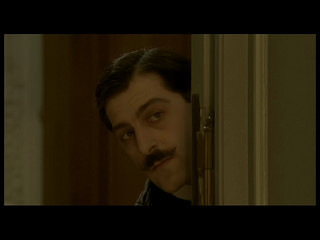
John Malkovich as Baron de Charlus:
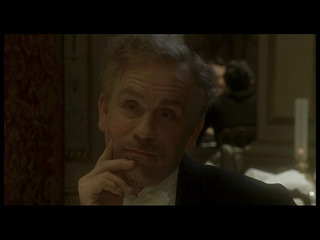
Catherine Deneuve as Odette de Crecy:
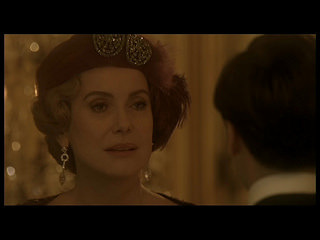
And Emmanuelle Béart as Gilberte:
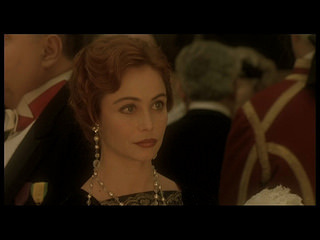
I think part of the problem is that they try to cram a bit too much into the film. But it has a lot of the big scenes from Time Regained as well as flashbacks to the other volumes.
Here's Marcel spying on Charlus in the hotel:
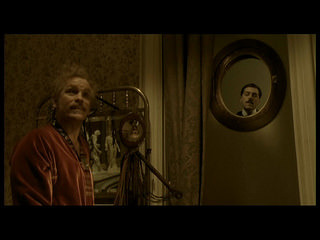
The young Marcel with his uncle and 'the lady in pink':

And Marcel talking to Aimé at Balbec:
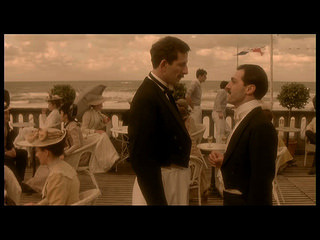
Next in line are Swann in Love starring Jeremy Irons & Fanny Ardant and The Captive.
 Ok, January 4th sounds good to me.
Ok, January 4th sounds good to me. I've added a new folder titled 'Re-reading ISOLT' and I've added a discussion thread for 'Swann's Way'. IF we re-read any more then we can add further threads as desired. I think a single thread for each novel should be sufficient.
At the moment I'm not contemplating re-reading further than 'Combray'....but you never know...
 This discussion is for anyone who is re-reading Swann's Way. There is no need to include 'spoiler alerts' as it will be assumed that anyone reading or posting here has read the whole novel.
This discussion is for anyone who is re-reading Swann's Way. There is no need to include 'spoiler alerts' as it will be assumed that anyone reading or posting here has read the whole novel.
 Is everyone still interested in a group re-read of Combray? If so, when do you want to do it? before Xmas or after? straight after Xmas or later? It's 225 pages in my edition so I may prefer to read it after Xmas but I'm flexible.
Is everyone still interested in a group re-read of Combray? If so, when do you want to do it? before Xmas or after? straight after Xmas or later? It's 225 pages in my edition so I may prefer to read it after Xmas but I'm flexible.
 Marcelita wrote: "Yes.
Marcelita wrote: "Yes.Here is just one reference:
Twilight of the Belle Epoque: The Paris of Picasso, Stravinsky, Proust ...
By Mary McAuliffe..."
That's a great snippet Marcelita. Have you read the whole book? It looks interesting.
I just noticed that the author also wrote 'The Dawn of the Belle Epoque' as well, which is a book I want to read as it partly covers Zola and the period in which 'Swann in Love' takes place.
 Dave wrote: "Yeah, I was a Henry Miller enthusiast when much younger. Have you read his "The Books in My Life"? Now there was an essay. I was (and am) big on essays on reading."
Dave wrote: "Yeah, I was a Henry Miller enthusiast when much younger. Have you read his "The Books in My Life"? Now there was an essay. I was (and am) big on essays on reading."I haven't read it but I downloaded a scanned copy of it a little while ago and nearly started it a few months back. I haven't read any Miller for years though. I couldn't recall him mentioning Proust in any of his books but I did notice that ISOLT is in his list (at the back of 'Books in My Life') of the books that influenced him the most.
 Dave wrote: "Heh, If its a book I'm tempted Jonathan. I read a number of essayists when younger but can't think of the last time. So no, probably not.
Dave wrote: "Heh, If its a book I'm tempted Jonathan. I read a number of essayists when younger but can't think of the last time. So no, probably not.Meanwhile, what happened to your Proust picture? I always ..."
He! He! My pic is back to the original 'boy smoking and reading Henry Miller's Sexus' - I added the Proust head whilst I was reading ISOLT.
I don't recall much (or any) smoking in ISOLT either - not even pipes! I wonder what Freud would say about that?
 Dave wrote: "Over the last few days I have been rereading Roger Shattuck's book since I know Renato plans to read and Jonathan is reading his book. This was one of the first books I read when I finished ISOLT l..."
Dave wrote: "Over the last few days I have been rereading Roger Shattuck's book since I know Renato plans to read and Jonathan is reading his book. This was one of the first books I read when I finished ISOLT l..."I plan to read this one at some point (I'm not reading it at the moment but I finished Patrick Alexander's book) but I'm not sure how well I will take to all this literary analysis and criticism as historically I don't cope with it very well. At the moment I'm planning on reading 'Night at the Majestic', 'M. Proust's Library' and the Carter bio. I will probably have a look at Beckett's essay on Proust as well, which should be interesting.
So, anyway I will tackle the Shattuck book and maybe some others and see where I end up. I usually get annoyed when literary critics seem to be 'inventing' too much or have some grand scheme that they want to impress everyone with.
BTW, have you been tempted to read any Mme de Sevigne's essays, Dave?
 Good stuff Marcelita. I found it amusing that the blogger had fears that he wouldn't live long enough to finish it as I had a similar fear a few months ago; I was feeling a bit ill and it crossed my mind that Proust died before he finished writing it and Moncrieff died before he could finish translating it....I thought 'is the book jinxed?' :-)
Good stuff Marcelita. I found it amusing that the blogger had fears that he wouldn't live long enough to finish it as I had a similar fear a few months ago; I was feeling a bit ill and it crossed my mind that Proust died before he finished writing it and Moncrieff died before he could finish translating it....I thought 'is the book jinxed?' :-)
 Dave wrote: "I have finally found an author who states that Proust meant for the book to be reread. David Ellison is Professor of Humanities at the University of Miami (FL). His short book "A Reader's Guide to ..."
Dave wrote: "I have finally found an author who states that Proust meant for the book to be reread. David Ellison is Professor of Humanities at the University of Miami (FL). His short book "A Reader's Guide to ..."Interesting, Dave.
BTW I'll probably set up some extra folders/threads for re-reads and supplementary reading when I get the time.
 Dave wrote: "But now I understand that to "get" the ending you have to reread the beginning. Now I consider the ending to be brilliant..."
Dave wrote: "But now I understand that to "get" the ending you have to reread the beginning. Now I consider the ending to be brilliant..."I love all the biographical detail, such as Francoise having an intuitive feel for his work, and I wouldn't want it to be scrapped or anything (Proust forgive), but I just thought the part with Mlle St-Loup was a more 'natural' place to end.
 Sunny in Wonderland wrote: "I wonder if a person's maturity (read: age) plays a role in whether or not they enjoy or finish this entire work. Some of the 'a-ha' moments at the end (not perceiving yourself as old, noting how ..."
Sunny in Wonderland wrote: "I wonder if a person's maturity (read: age) plays a role in whether or not they enjoy or finish this entire work. Some of the 'a-ha' moments at the end (not perceiving yourself as old, noting how ..."I don't think I would have got very far reading ISOLT when I was in my twenties either Sunny. What I love about ISOLT is that the characters feel like real people which is rarely the case in many novels, films or plays. Because we've seen the characters at different times, in a positive and negative light, we've seen them in different social settings, in good times and bad, we get a fully-rounded character.
 When I read the section (approx two paragraphs) where Gilberte's & St-Loup's daughter, approaches the narrator I got goose-bumps. It's the section that starts 'I saw Gilberte coming towards me.' With the sixteen year-old Mlle de Saint-Loup (do we know her first name?) standing before him he realises her 'tall figure was a measure of the distance I had not wanted to see.' i.e. a physical manifestation of the time he'd wasted. After comparing her physical characteristics to her mother, father and grandmother we get this great line:
When I read the section (approx two paragraphs) where Gilberte's & St-Loup's daughter, approaches the narrator I got goose-bumps. It's the section that starts 'I saw Gilberte coming towards me.' With the sixteen year-old Mlle de Saint-Loup (do we know her first name?) standing before him he realises her 'tall figure was a measure of the distance I had not wanted to see.' i.e. a physical manifestation of the time he'd wasted. After comparing her physical characteristics to her mother, father and grandmother we get this great line:I thought she was very beautiful: still full of hopes, laughing, formed out of the very years that I had lost, she looked like my youth.And BAM: 'The End', at least that's what I thought. It was a natural ending wasn't it? Now the twenty or so pages that follow are a brilliant and fascinating portrayal of Proust/the narrator as he grapples with starting the novel but I wonder if it should have been placed as an appendix or something? How do others feel about this?
 Dave wrote: " I didn't see the point of the outtake about the dying la Berma and her wicked daughter. I read a summary of Racine's Phaedra, if this is a "life imitates art" message it was lost on me. .."
Dave wrote: " I didn't see the point of the outtake about the dying la Berma and her wicked daughter. I read a summary of Racine's Phaedra, if this is a "life imitates art" message it was lost on me. .."I just took this part to be another example of 'how people's social status changes' which was one of the main points of the party. I wonder if he's also making the point that those true artists (La Berma) have been eclipsed by lesser artists (Rachel). She was also ending her days in a state that she'd probably acted out many times before, so yes, 'life imitates art'.

